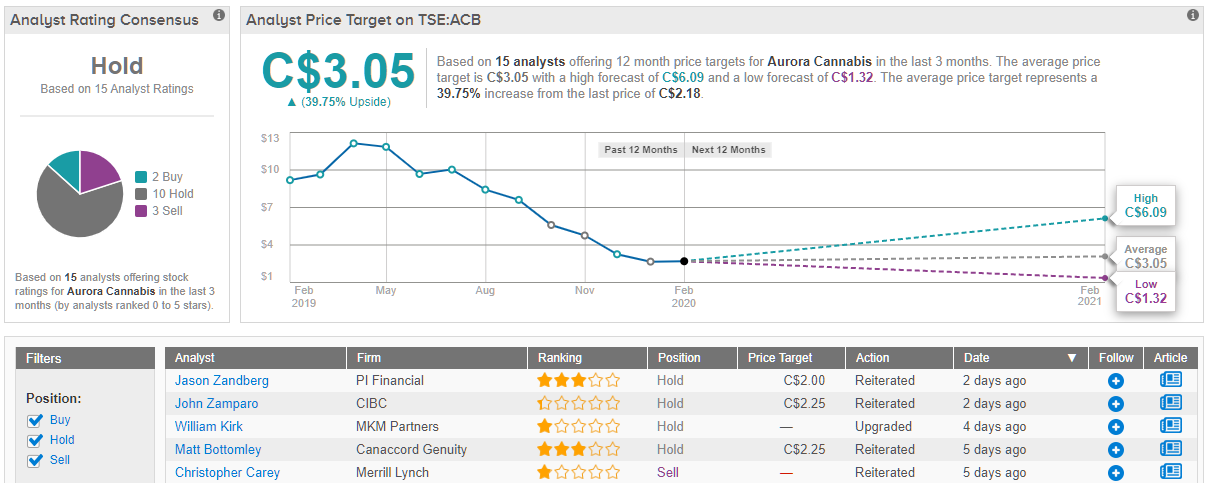The latest earnings report of Aurora Cannabis (ACB) came in as expected, with results confirming a weak quarter for the company.
While the worst appears to be over, a major problem is the lack of clarity in Canada especially, concerning what the actual demand for cannabis is.
In this article we'll examine why this will keep the future outlook of Aurora Cannabis and its Canadian peers in the dark, and what it means to long-term investors.

Lack of demand discovery
Anyone that understands why socialism never has worked, knows that the primary reason is the resultant lack of price discovery. Without that, economies aren't able to operate in an efficient manner.
Something similar is happening in the Canadian cannabis market in regard to demand discovery. What I mean by that is the horrifically slow licensing process that has failed to come close to meeting Canadian demand, has left a vacuum in regard to demand discovery that will take as long as two years to be solved.
By demand discovery I mean the lack of retail outlets that give investors an idea of what the actual demand for marijuana in Canada is. There are thoughts and projections in that regard, but that is only guessing at this time because of the inability of producers to sell at meaningful levels into the large provinces of Ontario and Quebec, which together represent over 22 million people as of 2019.
Until that changes, it's only guesswork as to the potential demand residing in those two large provinces. It can't be projected based upon sales in the smaller provinces because some of them generate a lot more sales per population than the others do.
How long will it take?
How long will it take to achieve Canadian demand discovery? It depends on the commitment of the two provinces, and if they can perform better at streamlining the process.
In the case of Quebec, it has stated in the past it isn't in a hurry to roll out new stores. That doesn't mean they won't improve on its lack of urgency, only that it appears it won't accelerate the process because of market pressure.
I think that could change, but there's no doubt of the two, Ontario has a much higher sense of urgency than Quebec has, and that's good for Aurora Cannabis, and the remainder of its peers based in Canada.
It looks like Ontario, once it starts expediting the licensing process, will continue to do so until the province has enough cannabis retail outlets to meet market demand. There's a long way to go before it reaches that permeation level.
Consensus Verdict
Most of Wall Street is surveying the embattled cannabis giant from the sidelines, with TipRanks analytics demonstrating ACB as a Hold. Based on 15 analysts polled in the last 3 months, 2 are bullish on the stock, 10 are sidelined, while 3 are bearish. However, the 12-month average price target stands at C$3.05, marking a nearly 40% upside from where the stock is currently trading. (See Aurora stock analysis on TipRanks)

Conclusion
Aurora Cannabis will continue to struggle until 100s of more Canadian stores are opened for business. The last eight months of 2020 are important in that regard because it doesn't look like things will pick up for the licensing process until April 2020.
Once that kicks into gear though, it should give a much clearer picture of what Canadian demand really is. In this case, because of it being in Ontario, and secondarily Quebec, we can get a clearer idea of what demand will be after several quarters of these new stores being opened.
That points to the latter part of 2020, or the first half of 2021.
As this happens, Aurora Cannabis will be given a chance to sell into, not only a larger retail market as measured by the number of retail outlets that are operational, but also presumable sell a significant amount of derivatives that command higher prices and wider margins.
Once demand discover for the Canadian cannabis market is visible, we can then look at how Aurora Cannabis can grow under that specific sector environment. We'll also be able to see what its potential growth trajectory is as this unfolds.
Again, for now this is all guesswork, but within a year or a little longer, these demand issues should be result in relationship to visibility, and assuming the provinces come through with 100s of more stores in the first half of 2021, we'll know what the real potential of the legal market is in Canada, and how much market share Aurora can take against its legal and illegal competitors.
Last, on the illegal side of the business, we should see that start to shrink as customers are provided more retail options to buy in, especially new customers that I think are waiting and willing to give legal cannabis a try.
All of this should benefit Aurora Cannabis. We'll have to wait to see to what degree by probably another twelve to eighteen months.
In the near term, I think Aurora could start to press toward the C$2.00 per share mark, unless there is a negative catalyst that emerges.
To find good ideas for cannabis stocks trading at attractive valuations, visit TipRanks’ Best Stocks to Buy, a newly launched tool that unites all of TipRanks’ equity insights.
The views and opinions expressed herein are the views and opinions of the author and do not necessarily reflect those of Nasdaq, Inc.





%20Stock%20Needs%20More%20Clarity%20Before%20Pushing%20Higher%20%7C%20Nasdaq&_biz_n=30&rnd=570334&cdn_o=a&_biz_z=1743335780371)
%20Stock%20Needs%20More%20Clarity%20Before%20Pushing%20Higher%20%7C%20Nasdaq&rnd=870327&cdn_o=a&_biz_z=1743335780375)